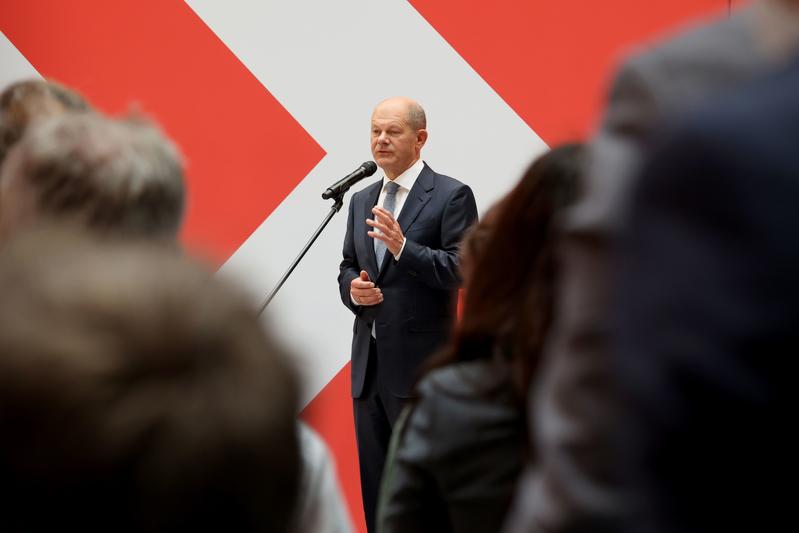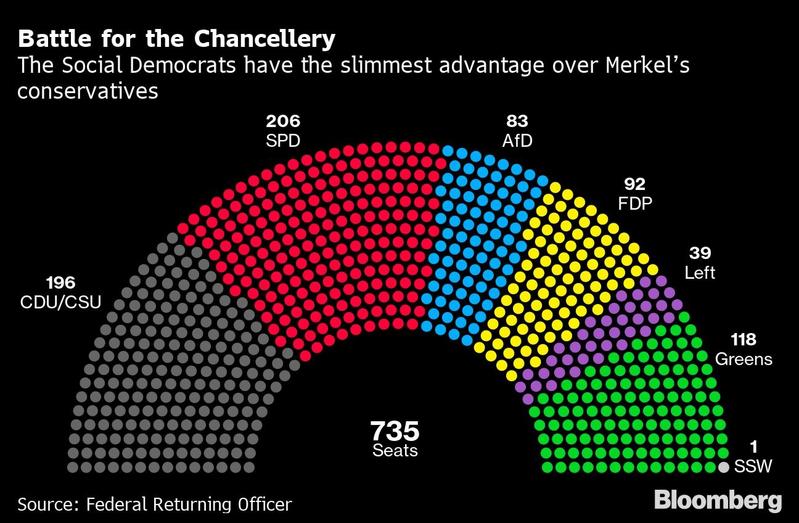 Olaf Scholz, chancellor-in waiting from the Social Democratic Party (SPD), delivers a statement to the media following the election at the party headquarters in Berlin, Germany, Sept 27, 2021. (PHOTO / BLOOMBERG)
Olaf Scholz, chancellor-in waiting from the Social Democratic Party (SPD), delivers a statement to the media following the election at the party headquarters in Berlin, Germany, Sept 27, 2021. (PHOTO / BLOOMBERG)
Germany’s Social Democrats under chancellor-in-waiting Olaf Scholz signaled progress in talks with the Greens on forming a coalition government with the Free Democrats, while Angela Merkel’s bloc kept the door ajar for a conservative-led alliance.
“The SPD is ready to start talks about a three-way coalition,” SPD General Secretary Lars Klingbeil told reporters. He was speaking late Sunday after the Social Democrats held separate talks with the two smaller parties on an alliance that would make Scholz the next chancellor.
A traffic-light coalition - named after the banner colors of the Social Democrats, Free Democrats (FDP) and Greens - has never been tried at the national level and presents a difficult choice for the pro-business FDP
Greens’ co-leader Robert Habeck expressed optimism that the SPD is “ready for a fresh start” after eight straight years as junior partner under Merkel, who didn’t seek another term in Germany’s election on Sept 26.
Scholz wants to quickly begin formal coalition negotiations with the Greens and FDP, with European partners eager to see a stable government as Merkel departs after 16 years at the helm of Europe’s biggest economy.
ALSO READ: Germany faces uncertainty after close election result
A traffic-light coalition, named after the banner colors of the three parties, has never been tried at the national level and presents a difficult choice for the pro-business Free Democrats. They campaigned on an economic platform that differs sharply from the center-left SPD and Greens, who are seeking more state control in transforming Germany’s industrial base.
The three parties would need to bridge contrasting positions particularly on climate and finances. Tax policy could be a stumbling block, as the FDP has pledged not to raise the burden on households and businesses.
“The FDP has said this clearly and the FDP will not move from this position,” the party’s general secretary, Volker Wissing, said Monday on ZDF television.
“We know that tax policy is always a major hurdle for coalitions,” he added. “That was the case in the past with the CDU and is especially now in talks with the SPD.”

On Tuesday, the Christian Democratic-led conservative bloc will hold talks with the Greens to test the ground for a partnership that could still make the CDU/CSU’s embattled leader Armin Laschet Germany’s next chancellor.
After talks with the Free Democrats on Sunday, the CDU/CSU renewed their offer for an alliance with the FDP and the Greens. While the Free Democrats see few policy hurdles for tying up with the conservatives, the Greens said they will decide on the next steps after talks with the CDU/CSU on Tuesday.
Scholz is well-placed to succeed Merkel after his SPD narrowly defeated Laschet’s CDU/CSU bloc in the election. Laschet, by contrast, is in an increasingly precarious position after support for the conservatives plunged below 30 percent for the first time in post-World War II Germany.
READ MORE: Germany's Laschet fights for his political life
The FDP’s Wissing said Monday that the party will wait for the outcome of Tuesday’s talks between the Greens and the conservatives before making a decision on how to proceed.
He warned against holding too strongly to certain policy positions, saying that could end up triggering another so-called “grand coalition” of CDU/CSU and SPD.
“Nobody wants that,” Wissing told ZDF.


